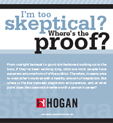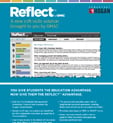 If you're attending the 28th Annual Conference of the Society for Industrial and Organizational Psychology in April, check out some of our esteemed Hogan colleagues as they present our latest research.
If you're attending the 28th Annual Conference of the Society for Industrial and Organizational Psychology in April, check out some of our esteemed Hogan colleagues as they present our latest research.
THURSDAY, APRIL 11
International Perspectives on Combining Personality and Multirater Feedback Data
Many organizations include personality assessments and multirater feedback instruments in selection batteries or development initiatives, but they rarely combine these sources of information to maximize developmental outcomes that mutually benefit individuals and the organization. Participants will share international perspectives on combining these sources of information and the ROI of doing so.
Blaine Gaddis
Comparability of Scores: Equivalence Issues in Testing Across Countries
This study considers approaches to a range of issues relating to score comparability in multinational testing. These range from use of DIF and generalizability theory through applications of SEM to more general considerations of the impact of cultural differences on attitudes to testing.
Kevin Meyer, Jeff Foster
Job Analytic Comparisons of Competency Requirements in Global Managerial Jobs
Existing research has examined similarities and differences in global leader behavior. However, these initiatives focus on the individual as their unit of analysis. This research uses jobs as the unit of analysis, analyzing archival job data to examine similarities and differences in competencies required for managerial jobs around the world.
Dara Pickering, Blaine Gaddis
Identifying Critical Job Family Competencies: Within and Across Job Families
This study used data-driven best practices to identify the most critical competencies for 4 job families: service and support; professionals, operations, and trades; and technicians and specialists. Although subject matter experts rated 4 competencies as critical across the 3 job families, other competencies were unique to each job family.
Ashley Palmer, Steve Nichols
A Sticky Topic: Using Personality Tests in Selection Settings
Industry remains hesitant to utilize personality tests in applicant screening due to low criterion validity in predicting job performance. An expert panel is consulted on the use of personality tests in selection settings toward improving criterion validity and offers recommendations promoting the use of personality data in selection.
Kevin Meyer
The Role of Theory in Advancing Personality Assessment at Work
Toward making innovations “stick,” 4 leading personality researchers discuss the role of theory in advancing personality test use in work settings. Key issues include why theory is especially important in this area, which theoretical principles are important, hurdles blocking utilization of theory, and the future of personality assessment at work.
Robert Hogan
FRIDAY, APRIL 12
Leadership Assessment: Contemporary Issues and Challenges in Demonstrating Value
Identifying and developing leadership talent continues to be a key concern for organizations. Recent advances in technology and research have spurred the development of automated assessments and models to leverage data, making leadership assessment more accessible and affordable. This session explores opportunities to demonstrate the value of assessment to organizations.
Ryan Ross
Why Is the Leadership Development Industry Failing?
Since 1995, leadership development has grown 30% into a $12B industry in the U.S. In the same time, public confidence in leadership has declined 30%, and most corporations report lacking adequate leadership capacity. This session discusses why the leadership industry seems to be failing and what to do about it.
Robert Hogan
Industry Differences: Mine Is Unique…Right?
Organizations believe important differences between industries exist and request industry-specific comparisons. This symposium will explore the size of differences in personality traits, values, competencies, and attitudes between industries. Job function and managerial level differences are also presented. Implications, including those for selection and development, are discussed.
Steve Nichols, Jeff Foster
Advances in the Use of Personality to Predict Workplace Criteria
Although research relating personality to work outcomes has progressed, more is needed to refine the criteria that are predicted by different traits and relevant boundary conditions involved. This session presents 4 papers that approach the issue of what is understood about using personality tests to predict criteria from different perspectives.
Ashley Palmer
SATURDAY, APRIL 13
Linking Personality and 360 Assessments to Coach and Develop Leaders
This session examines the combination of personality and 360 (multirater) assessment for the development of leaders. Two empirical studies demonstrate how coaching insights are produced by the convergence of the 2 types of assessments. In addition, 2 large-scale organizational case studies demonstrate the application and practical utility of the approach.
Rodney Warrenfeltz
Destructive Leadership: A Holistic View for Minimizing its Toxic Influence
This session focuses on consolidating current research on destructive leadership to support a more comprehensive definition. It emphasizes the importance of considering leaders, followers, and the environment in the destructive leadership process. Moreover, it examines this process in a specific context to gain insight into preventing destructive leadership in organizations.
Robert Hogan
 Although much of the panic surrounding their generation has subsided, the fact that many Millennials struggle to find and maintain employment has not. According to recent numbers from the U.S. Department of Labor, unemployment among Millennials (ages 18-29) was nearly double the national unemployment rate in January 2013, having risen faster than any other demographic.
Although much of the panic surrounding their generation has subsided, the fact that many Millennials struggle to find and maintain employment has not. According to recent numbers from the U.S. Department of Labor, unemployment among Millennials (ages 18-29) was nearly double the national unemployment rate in January 2013, having risen faster than any other demographic.


 Developed in partnership by
Developed in partnership by  If you're attending the
If you're attending the  The Motives, Values, Preferences Inventory identifies the core goals, drivers, and interests that determine what gets people to the office each day. The MVPI consists of 10 primary scales, which are further divided into five item themes. The MVPI item themes provide additional interpretive power by categorizing participants’ responses to the questions that compose each MVPI scale.
The Motives, Values, Preferences Inventory identifies the core goals, drivers, and interests that determine what gets people to the office each day. The MVPI consists of 10 primary scales, which are further divided into five item themes. The MVPI item themes provide additional interpretive power by categorizing participants’ responses to the questions that compose each MVPI scale. Most people have experienced some form of office politics, and it's wise to view other’s motives with a healthy amount of skepticism. But where is the line between skepticism and paranoia, and at what point does that paranoia interfere with a person’s career?
Most people have experienced some form of office politics, and it's wise to view other’s motives with a healthy amount of skepticism. But where is the line between skepticism and paranoia, and at what point does that paranoia interfere with a person’s career? An individual’s ability to exercise leadership is hinged on his or her ability to persuade others to follow. According to the Hogan Leadership Model, followers look for four essential qualities in a leader: integrity, judgment, competence, and vision. Of these, integrity is most essential.
An individual’s ability to exercise leadership is hinged on his or her ability to persuade others to follow. According to the Hogan Leadership Model, followers look for four essential qualities in a leader: integrity, judgment, competence, and vision. Of these, integrity is most essential. Hogan and the Graduate Management Admission Council (GMAC) partnered to launch Reflect by GMAC, the first self-directed, personality-based development tool designed to bring the power of self-awareness to B-school students.
Hogan and the Graduate Management Admission Council (GMAC) partnered to launch Reflect by GMAC, the first self-directed, personality-based development tool designed to bring the power of self-awareness to B-school students.